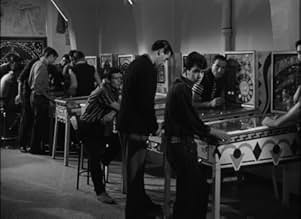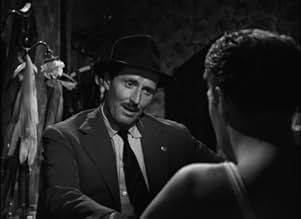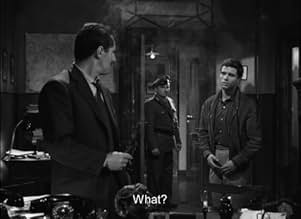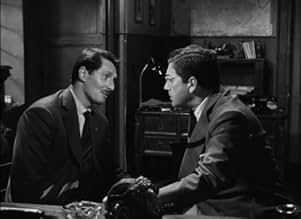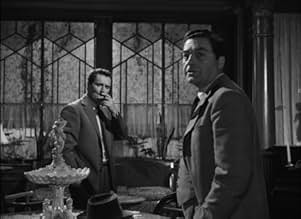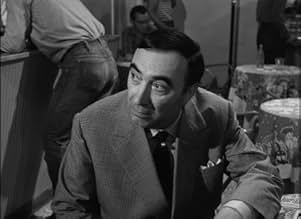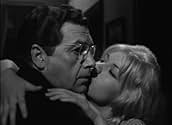IMDb RATING
7.4/10
1.7K
YOUR RATING
A police detective and his team attempt to solve two crimes committed within a day of each other in neighboring apartment rooms.A police detective and his team attempt to solve two crimes committed within a day of each other in neighboring apartment rooms.A police detective and his team attempt to solve two crimes committed within a day of each other in neighboring apartment rooms.
- Awards
- 5 wins & 3 nominations total
Cristina Gaioni
- Virginia Caraci
- (as Cristina Gajoni)
Ildebrando Santafe
- Anzaloni
- (as Ildebrando Santafé)
Silla Bettini
- Il brigadiere Oreste
- (as Silla)
Featured reviews
Pietro Germi doesn't belong to "high class" of the Italian's directors as federico Fellini, Visconti, Rossellini and others, due he was a bad temper, rough and refuses make part of this circle, he was unique, he implied an American style in his pictures, In Maledetto Inbroglio was clearly one of them, the plot is split in two striking cases, a robbery and a murder, just connected by both were took place in next door, Pietro Germi plays a chief of police at task force in charge to investigate both cases, seemingly has some connection linking those weird happenings, two exhaustive hours were spent to find out the murder, despite Germi changes the ending, he imposes a frenetic non stop acting which thrilled the viewer, a hard and complex case to solve, due countless directions that arise at any moment, a fabulous picture, on those quaint Italian environment, with a bit odd humor, a movie to be discovered for the new generation of cinephiles, highly recommended!!!
Resume:
First watch: 2019 / How many: 1 / Source: DVD / Rating: 9.25
Resume:
First watch: 2019 / How many: 1 / Source: DVD / Rating: 9.25
The early Germi films, though they take place in Italy, are mostly pastiches of American genre films. IN THE NAME OF THE LAW (1948) borrows from a host of American westerns about sheriffs who, against all odds and without much help from the townspeople, clean up the town and expose the complicity between a prominent town father and the outlaws. THE WAY OF HOPE (1950) is much like THE GRAPES OF WRATH, depicting the trek of a group of dispossessed workers following an evanescent lead for work in another land. (There's even a scene where they get work on a farm and are called scabs by striking workers, very similar to Ford's film.) THE BRIGAND OF TACCA DI LUPO (1952) is similar to Ford's FORT APACHE: the martinet who insists that men on field campaign for three years adhere to strict protocol, who doesn't know the difference between a good Indian and a bad one, and who insists on leading his men into danger against all the advice of seasoned professionals. FOUR WAYS OUT (1952) is much like THE ASPHALT JUNGLE in plot and tone. All of these films are impeccably made, beautifully photographed and acted, with no false notes, and with neorealist overtones (three were co-written by Fellini). However, they're all a bit slow, a bit too derivative, and they all generate more respect than enthusiasm.
THE FACTS OF MURDER is something else entirely, It is another genre film, borrowing from many police procedurals, yet here one feels that Germi has finally graduated from respectful pastiches to create a work that is completely successful on its own. The plot, about a robbery in one apartment, and a murder in an apartment across the hall a week later, is so complex that it's hard to follow at times (in some ways it's similar to the complex Chandler novels, and with a similar denouement) but it's richly detailed, with many interesting characters. Germi is a superb actor and his handling of other actors is sure. The interplay between the three detectives is sophisticated and clever, and has the ring of actuality. The pace is fast but not rushed, and the writing and the pictorialization are richly nuanced. Above all, it is a highly entertaining film!
This is the film where Germi seems to have come into his own as a master filmmaker, where he still has some the neorealist characters and story structure from his earlier period but also has the biting humor and social satire of his later films. It rivals DIVORCE ITALIAN STYLE as his best film, and is a must see.
THE FACTS OF MURDER is something else entirely, It is another genre film, borrowing from many police procedurals, yet here one feels that Germi has finally graduated from respectful pastiches to create a work that is completely successful on its own. The plot, about a robbery in one apartment, and a murder in an apartment across the hall a week later, is so complex that it's hard to follow at times (in some ways it's similar to the complex Chandler novels, and with a similar denouement) but it's richly detailed, with many interesting characters. Germi is a superb actor and his handling of other actors is sure. The interplay between the three detectives is sophisticated and clever, and has the ring of actuality. The pace is fast but not rushed, and the writing and the pictorialization are richly nuanced. Above all, it is a highly entertaining film!
This is the film where Germi seems to have come into his own as a master filmmaker, where he still has some the neorealist characters and story structure from his earlier period but also has the biting humor and social satire of his later films. It rivals DIVORCE ITALIAN STYLE as his best film, and is a must see.
Gadda's masterpiece is a blend of philosophical novel with mystery and murder, a baroque, caustic and ultimately poignant work exploring the myriad of interactive lives' endless and kaleidoscopic complexities - in other words, causes often interrelated that converge to the production of each individual effect. The book was rather flatenned here, but still it's Germi's most lasting and currently estimable movie, even better than The Road to Hope and Seduced and Abandoned.
Un maledetto imbroglio (1959) is a very good movie, it tells us about a country -Italy- still far from the wealth of the sixties, where low class people struggled to make a decent living, and illiteracy was still spread ... Higher class people could threaten poor peoples lives for trivial reasons and meantime humiliate them with their unjustified wealth ... Of course the Germi's task was simplified by the great book it started with, still the Director has his merits: the irony to start with. I basically agree with other opinions. if a catch can be found, I'd say acting is a little bit much too heavy. A kind of "Venus's strabismus"... Some of the actors (Eleonora Rossi Drago, Nino Castelnuovo and at times also Germi himself)overdo - overindulge in - their roles ... They fall into unnecessary theatrical poses. to my opinion the drama is in the facts being narrated and need not much emphasizing by the actors.
very good by all means, but just a bit overacted, to my modest opinion.
pion
very good by all means, but just a bit overacted, to my modest opinion.
pion
How beautiful Claudia was, and what a cool role she plays! She is the most impressive of all, she doesn't have too many lines, but what a feeling, what a look. Then, Alida Chelli's very powerful song - "Sinnò Me Moro", stirs you deep into the heart. Excellent Pietro Germi, as a director and actor! All the others are excellent: Franco Fabrizi, Claudio Gora, Eleonora Rossi Drago, Nino Castelnuovo, Saro Urzi. 10 stars at least!
Did you know
- TriviaThe murder takes place at 44 Piazza Farnese in Rome, Italy.
- GoofsThe cameraman is clearly visible on the left of the frame in the actual murder scene.
- Alternate versionsA restored version has been released in 1999, edited by Vincenzo Verzini.
- ConnectionsFeatured in Cinema forever - Capolavori salvati (2001)
- How long is The Facts of Murder?Powered by Alexa
Details
- Release date
- Country of origin
- Language
- Also known as
- The Facts of Murder
- Filming locations
- Production company
- See more company credits at IMDbPro
- Runtime1 hour 55 minutes
- Color
- Aspect ratio
- 1.37 : 1
Contribute to this page
Suggest an edit or add missing content


